Spoiler Warning!
This article contains major spoilers for Red Dead Redemption 2.
If you haven't played the game, I have written a review to help you decide if it's a game for you. RDR2 is a brilliant game that you do not want to miss.
In fact, this is written with the assumption that you have already played the game, so some events I am referring to may not make sense otherwise.
You are stongly advised to play the game before reading this article. You have been warned.
Introduction
Faith is portrayed extensively throughout Red Dead Redemption 2 in various different ways, whether this be as the binding force that holds the gang together, characters having faith in each other, or in religion itself. Either way, Red Dead Redemption 2 asks the player to reconsider what they put their faith in, providing a reminder of what can happen if faith is misplaced.
Just to clarify, 'faith' simply means 'trust'. Everyone is constantly putting their faith in something, whether this be a religion, a person, or something else. What's important is why - what evidence is there to justify trusting that person, or believing in that ideology. This essay will analyse how Red Dead Redemption 2 presents faith in different ways throughout the narrative, and some ways in which this can apply to our lives.
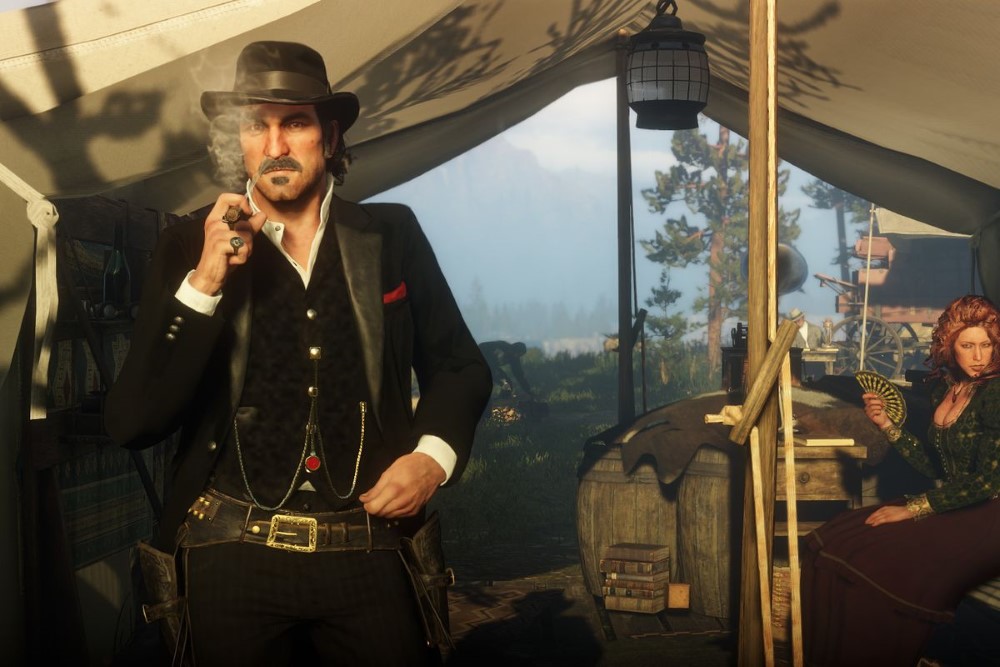
Faith to Maintain Social Cohesion
The gang in RDR2 would simply not exist if it were not for tremendous amounts of faith on behalf of each and every gang member. Everyone mucks in, doing chores and making money like a big family. Not only this, but gang members are willing to risk their lives for the gang without any thought whatsoever. It's just what they do. It's this unquestioned trust for each other that makes the gang so successful throughout much of the game. Even though not all of the characters like each other, they will go to great lengths for each and every member of the gang. This can be seen when Arthur agrees to rescue Micah out of prison, simply because of the fact that he is a member of the gang, despite not liking the character at all. Characters are more than happy to kill many people to save one member of the gang, as they care for each other so much, displaying an inherent conflict between morality and loyalty. To what extent does one go to save the people they love? Even Arthur could've abandoned everything for his girlfriend, but he chose not to because he genuinely cares for the people of the gang. It is this reckless, blind faith that ultimately keeps the gang together for better and for worse.
This is also mirrored in much of ancient history as religion was used as a force to establish common rules and build a society. In the past, religion has unified lots of people to create a sense of cohesion which is so critical to build a successful society. Even now, while we have plenty of laws to define a separate 'moral framework', it is still true that religion generally drives people to be more positive contributors to society.
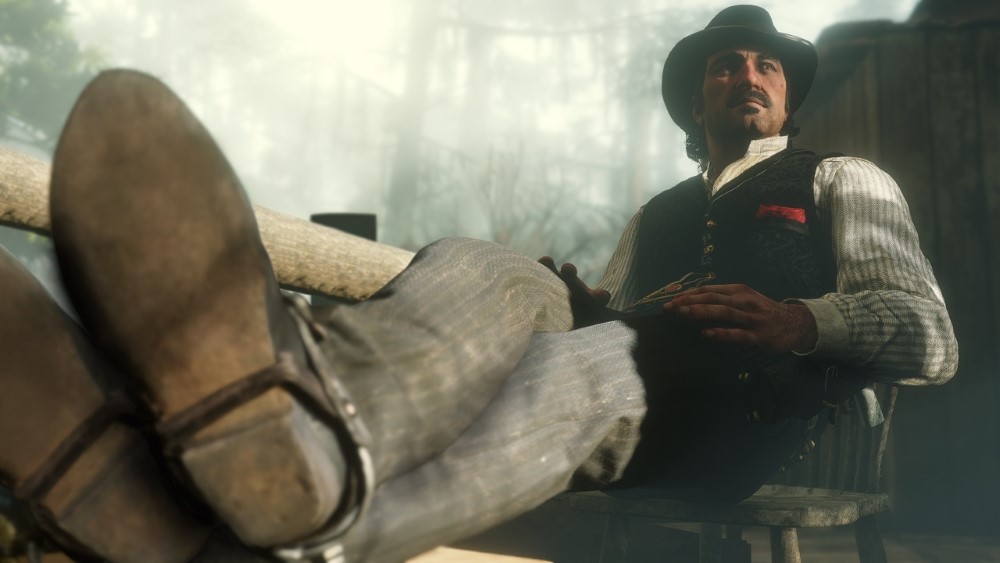
Faith and Manipulation
Dutch is infamous for his speeches surrounding faith. "You have got to keep faith", he says, attempting to persuade people to have faith in him, "Just have some goddamn faith!". However, while potentially inspirational, these speeches turn out to be very manipulative. Dutch has founded a gang made up of people that he has saved, giving people a huge amount of loyalty to him. Dutch is also never afraid to preach an ideology saying, "We're trying to reform society to a kinder, truer, better way". Yet the gang members don't seem to question this. What if the end result doesn't actually outweigh the means required to reach it? What if it isn't actually possible at all? Arthur begins to take issue with this, opting to challenge Dutch, stating "We're thieves... in a world that don't want us no more". It's easy to side with Arthur's more realistic point of view. Dutch is trying to manipulate people into believing in his ideology by making it sound far greater than it actually is, or ever would be. On the surface, Dutch's speeches sound inspirational, but deep down they are just Dutch trying to get the gang behind him and prevent anyone from leaving. Even right up until the end, Dutch says, "We will survive" and "They will not crush us" (clearly 'they' is antagonising the society as a whole, creating an 'us vs them' type scenario).
Never is this more evident than when Arthur asks for Dutch to let John and his family go towards the end of the game. Dutch is somewhat startled by this request, almost confused as to why they would want to leave. "There ain't no freedom for no-one in this country no more", says Dutch, trying to argue that true freedom is found in the gang and that society is not free. Dutch thinks that being under his control will give people more freedom than if they are able to be independent members of society. And when Arthur 'insists', Dutch is startled. Arthur has barely questioned Dutch, and for him to 'insist' upon it is surprising. Dutch is clearly very unhappy with this attitude from Arthur, as he likes to always be in control.
For Dutch, everything is about him. Even at the end of the game, he says "who amongst you is with me, and who is betraying me?", as if everyone else was betraying him, rather than the other way around. It's all about him. Dutch does not accept blame for wrongdoing, instead attempting to justify every action, which becomes progressively more difficult throughout the game.
As before, this is paralleled by much of society. It's very easy to believe something just because someone says it enough times in a convincing manner. This is widely observed through radicalisation, which is presented through the game in terms of one cult in particular.

Radicalisation & Cults
In the game, there is a cult called Chelonia. Arthur encounters this cult in a quest where he is tasked to rescue Jamie from it. After trying to talk Jamie out of it to no avail, he resorts to knocking the leader unconcscious. Jamies flees and is chased by Arthur, but when Arthur catches him, Jamie chooses to attempt to kill himself rather than have to be separated from the cult. This is a testament to the immense power of radicalisation, how someone can be completely transformed into wanting to die for a cause they have no evidence for. After Arthur shoots the gun out of his hand, he eventually comes to terms with his foolishness and leaves the cult, however this never caeses to astound - how he would prefer to die than to simply be separated from the cult.
Unfortunately, this can be mirrored through much of society. Terrorist attacks are becoming ever more frequent, often committed with blatant disregard of the religion they claim to be in favour of. However, this can also be seen with the rising of fake news, antivax, and flat earthers to name a few. Much of this can be attributed to the rise of social media, making it easier than ever before to join isolated communities and surround yourself solely with people you agree with. In a society with so much division, this is simply making people's beliefs stronger, rather than allowing them to be challenged. In some countries, it is even illegal to challenge religious beliefs, a law that is outrageous and equivalent to 'intellectual suicide'. It is important that everyone makes a conscious effort to surround themselves with and make conversations with people they disagree with, otherwise there will just end up being more differing beliefs that are held even more strongly, regardless of the evidence behind them. Given enough conversation, the truth will always prevail.
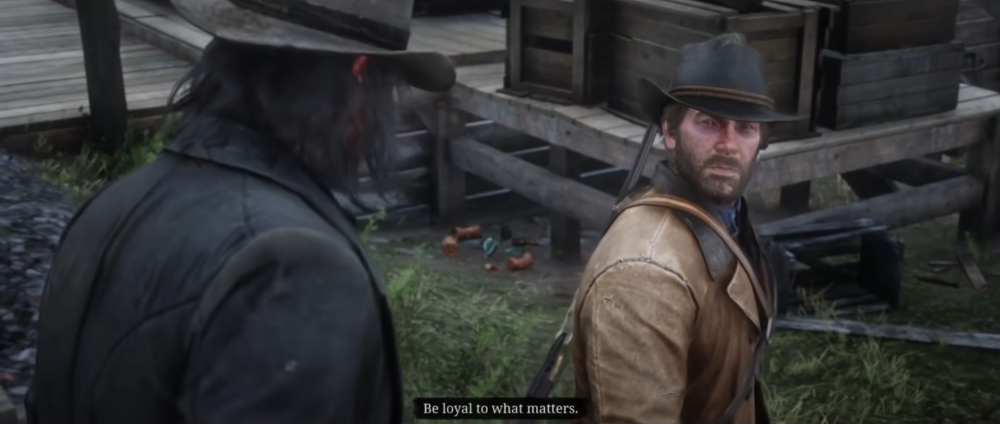
Arthur's Shifting Loyalty
Arthur has been with the gang for over 20 years, and was taught everything by Dutch. Dutch is like a father to him, someone he looks up to. For much of his life, Arthur never questioned anything Dutch said. Loyalty was the only thing Arthur stood for, only thing he believed in. He was a member of the gang, and that was his identity, that was who he was.
However, this all changed once Arthur was diagnosed with TB. Suddenly, Arthur started to see his life clearly, and recognise where his faith lies. Arthur starts to lose faith in Dutch, but he doesn't find it easy to leave the gang. Gradually losing faith in Dutch, he was saying things as direct as, "this is over", yet still does not leave the gang - why? Could it be that he is just so loyal, or that he just decides he will die soon and doesn't have anything to lose? It is more likely that Arthur simply cares so deeply about the other characters, John in particular, that he could not abandon them.
"You been loyal, I been loyal. Look what that caused. You know, all that ever mattered to me was loyalty. It was all I knew. It was all I ever believed in... but not anymore, John." - Arthur Morgan.
Surprisingly, John finds it even harder than Arthur to leave the gang. "But what about loyalty to... everything", John asks. Notice how John says 'everything' here when he is merely referring to 'the gang'. This is such a direct quote that demonstrates that the gang is everything to John. Giving up 'everything' is not easy. It's like giving up his whole life, everything he's ever lifed for. But Arthur manages to change his mind, as he is "seeing things more clearly now". Arthur's diagnosis is pivotal in the plot as it allows Arthur to see things differently and help other characters to do the same, so that at least someone can 'make it'.
This is paralleled in religion, where people attribute so much self-worth and so much of their identity to a god, making it incredibly hard to give it up. This leads to situations where people continue to practice a faith not based on evidence, but in spite of it. This can be very damaging, as has been explored above through cults and radicalisation. It is crucial that everyone konws what they believe and why they believe it, as believing in things without proper evidence is just plain stupid.
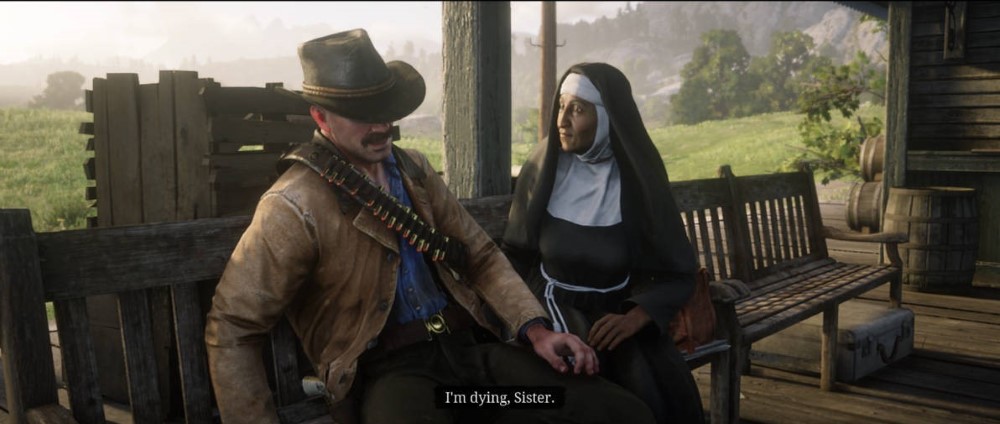
Sister Calderon & Religion
Arthur encounters Sister Calderon a few times throughout the game, but there is one particular scene which stands out as one of the best scenes in the entire game. Give it a watch.
The Sister begins by asking "are you okay", and Arthur gives a classic response which couldn't be further from the truth - "Never better". However, the sister manages to progress this conversation very quickly into a deep and meaningful one. Arthur admits he's lived a bad life, but Sister Calderon points out that he is not alone in that. She notes that whenever she sees him, he is always helping people and smiling. This perspective is so critical to Arthur - it shows that even though he has harmed many people, he can still have a positive impact on some and that matters. Arthur reveals how much suffering he has been through, but Sister Calderon never fails to grant Arthur perspective and show him that love and beauty exists in the world.
The first point in which Arthur is prompted for his view on eternity is with Mrs Downes. "I hope it's hot and terrible, Mrs Downes. Otherwise I'll feel I've been sold a false bill of goods". Almost jokingly, Arthur shows little to no interest in eternity, knowing that he is a bad person but refusing to change. Here he is still clinging to loyalty, putting all his faith into the gang and Dutch's teaching, for better or for worse. However, skipping forward to the conversation with Sister Calderon, his attitude has clearly changed.
When encouraged to do a loving act, Arthur responds with "But I still don't believe in nothing". It is clear that Arthur is attributing morality soley to religious belief, and not finding any justification for doing good things without it. This reflects the view that "If God does not exist, then everything is permissable". Arthur has clearly shifted from his original perspective of not caring about eternity, to contemplating deeply that it might actually exist, and wondering what to do about it.
It's at this point when Arthur says one of the best lines in the game, "I'm afraid". Arthur is contemplating eternity. He does not know what will happen, and finally he is in a position where he is no longer in control. He's dying and there's nothing he can do about it. He can't just blast his way out of hell as he has done for much of the gamg. Arthur is starting to feel the weight of his own sin and realise that what he has done in the past is not morally justifiable. Dutch was wrong, and he is just a thief "in a world that don't want us no more".
Finally, the Sister encourages Arthur to do a loving act, by taking a 'gamble that love exists'. The use of the word 'gamble' is very interesting here - 'take a gamble that love exists'. What a weird phrase. Arthur knows that love exists as he has been the recipient of some very generous acts in the game, such as the very expensive gold bar that is given to him earlier on. However, it's possible that Arthur hasn't quite realised this and it is only now he is realising how other characters have been acting out of love. Alternatively, the nun could be referring to more than just 'love', and instead using love as a metaphor for Christ. If we replace this, the statement reads "take a gamble that God exists (that heaven and hell are real), and try to make up for your wrongdoing". This makes far more sense as something a nun would say. Maybe the nun thought she couldn't quite directly talk about God, or potentially Rockstar felt it was a topic better avoided, but either way it seems like this is what the nun was actually referring to.
However, there is a glaring issue with this statement. While many religions profess a view of salvation by works (i.e. if you are a good person, you will go to heaven), Christianity presents a very different view. Christianity is not about trying to earn God's acceptance, but is instead through having a meaningful relationship with Him. Everyone has sinned (as the nun does correctly mention) and fallen short of God, and no-one can reconcile this on their own. This is why Jesus came to take the burden of sin and die for everyone, so that all we need to do is to simply accept Jesus' gift of grace to be saved. "For God so loved the word that he sent his one and only son so that whoever believes in him shall not perish but have eternal life" John 3:16. "For it is by grace you have been saved ... not by works, so that no one can boast" Ephesians 2:8-9. If any character knows this, it's going to be Sister Calderon! This is why it is very surprising that she does not refer to Christ, as Jesus said "No one comes to the Father except through me". Arthur is without hope, admitting that he is afraid, yet instead of sharing this ultimate hope with him in his time of desperate need, the nun chooses to simply suggest being a good person. She must be aware that Arthur cannot save himself, and needs to accept the free gift of Christ's death upon the cross to receive eternal salvation. While Arthur could've found salvation outside of what the game shows, this is unlikely. It is more likely that Arthur tried to save himself by trying to do good works, however many have tried this before and all have failed. The truth is that, in the Christian faith, everyone has fallen short of God's standards and is unable to save themselves, but only by God's grace alone can they receive eternal life.
Sister Calderon is such an important character as she prompts Arthur to open up in a way that he never has to anyone else. This was such an interesting and emotional scene as the player witnesses Arthur display emotion which he has kept very private for much of the game. Ultimately, the Sister gives Arthur a new perspective on life, and from this point onwards Arthur tries to make up for what he's done. While it ends with Arthur still having no hope of salvation, this is most likely a result of Rockstar not wishing to bring too much of a religious theme into the game, given they are dealing with very high budgets.
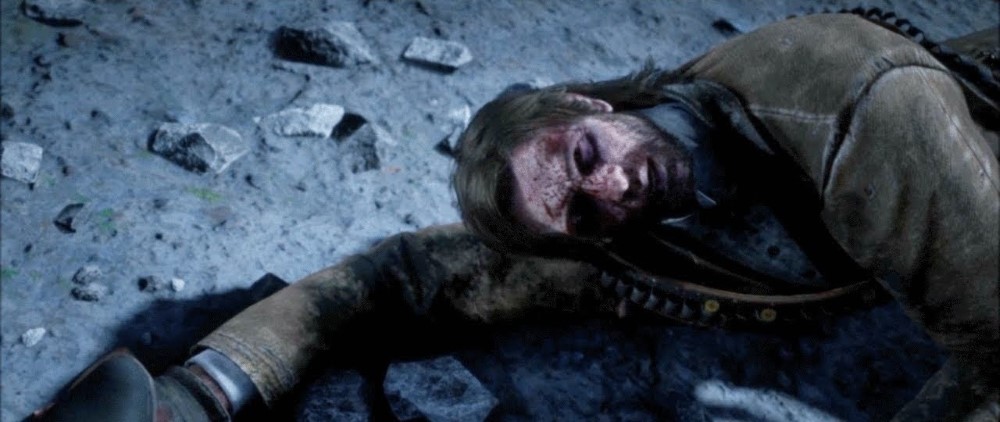
When Faith is Misplaced
It's not too long after this that Arthur's time does in fact come to an end, through an absolutely brilliant ending sequence. While Arthur has stuck with the gang for so much of the game, it's now that Arthur decides who and what he will be loyal to. He is an independent person with independent morals, and will not simply go along with Dutch any more.
The last ride to camp is a space for Arthur to reflect on the various good deeds he has done recently, although there is a sense that these are simply not enough to redeem a life full of killing and immorality. However, it's at this point that Arthur has one objective only. He knows he is going to die, so instead is dedicated to save John and ensure he gets a decent life afterwards. In typical Arthur fashion, he doesn't do this with a long speech, instead opting to say "Get the hell out of here and be a goddamn man!". To say this when giving up your life for someone else is a testament to how much Arthur cares for others, but also shows he has come to terms with his own death. He doesn't seem as afraid any more, seemingly aware of exactly what is going to happen.
After much fighting, as Arthur is about to die, he mutters to Dutch, "I gave you all I had... I did". This is so truthful, Arthur reflects on his unquestioned loyalty to the gang, and looking at where that got him. This is the only thing Arthur can really say he did right for much of the game, and Dutch is there looking down at him. Maybe as Arthur is moments from death, this is when Dutch begins to realise that this is partly his own fault. However, he would never admit this, even as Arthur passes away.
"I tried... In the end... I did". Yes, Arthur Morgan, you tried. Arthur was dealt a bad hand in life and stuck in a cruel world. Ultimately, most players will agree he was a good man in a bad situation, but whether that entails redemption (i.e. going to heaven) is not quite as clear.
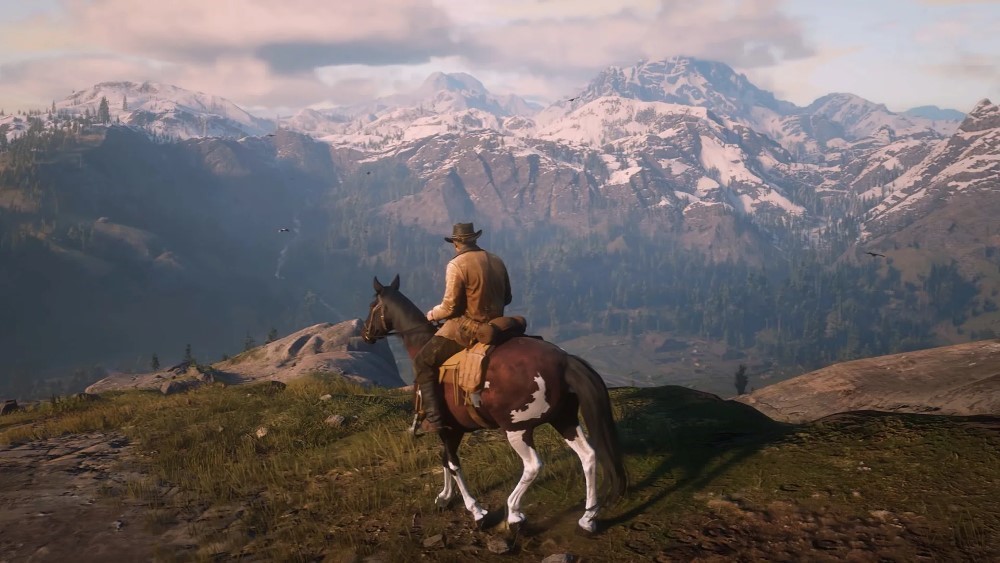
Application
It's at this point the game is subtly inviting the player to contemplate on where their own faith lies. Who, or what, do you have your faith in, and why?
Are you putting faith in a group of people who can't be trusted? Are you believing in some ideology simply because it's all you've ever known? Are you believing in God without properly evaluating the evidence to understand why you believe what you do? Red Dead Redemption 2 presents many reminders of the necessity and power of faith to achieve things that would not otherwise be possible, but is also filled with poignant reminders of the consequences of when faith is misplaced.
What do you believe in? Why do you believe that? Do you look forward to conversations about it, or are you afraid that people will challenge your beliefs. Because if you can't justify your own beliefs, then it might not be worth believing in anyway. And you may just end up like Arthur Morgan in Red Dead Redemption 2.
More About RDR2
I've also written a review for RDR2 which you can find here.








